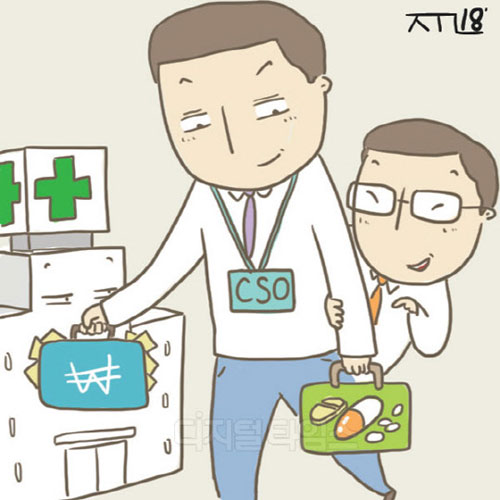Pharmaceutical market in reverse relationship…Weak CSO control over pharmaceutical firms
Kim Ji Seob | cloud50@ | 2018-04-30 10:43:36

According to the pharmaceutical industry on April 29, CSO utilization is growing rapidly, especially among pharmaceutical companies, which are operating mainly in the field of cloning drugs without new drugs. H`s sales commission paid to CSO last year was KRW 62.3 billion, which accounted for 47% of sales. M also paid a sales commission of KRW 17.4 billion, equivalent to 41.6% of sales. According to industry estimates, there are now about 4,000 individual CSOs. From the perspective of pharmaceutical companies, CSOs have a peak in that they can reduce fixed costs of operating sales organizations and build flexible strategies for products and regions. Some CSOs, however, are reported to be operating in a way that they receive 30 to 40 % higher fees from pharmaceutical companies and provide some of them as illegal rebates to hospitals. CSO is not a drug supplier and has been in secret business with pharmaceutical companies because it is in the blind spot of illegal rebate crackdown. Actually, a drug company has been caught by prosecutors for three years since 2014, delivering KRW 1.2 billion to the hospital through the CSO.
The National Commission for the Rights of the People recently advised the Ministry of Health and Welfare to penalize third party illegal rebates through CSOs as sales using CSOs became a hotbed of illegal rebates. Besides, CSO has also submitted an expense report on the provision of economic benefits, which is currently limited to drug suppliers. The Ministry of Health and Welfare plans to strengthen its management by forming a Task Force Team (TF) with the Korean Pharmaceutical Biological Association and the Global Pharmaceutical Industry Association. Yoon Byung-chul, director of the Department of Pharmaceutical Policy at the Ministry of Health and Welfare, said, "When CSOs provide economic benefits to healthcare providers, pharmaceutical companies are also 100% responsible for supervision."
This has added the obligation to supervise the CSOs to the pharmaceutical companies, but it is not easy for CSOs to comply with the CSOs because they have contracts with a number of individual companies. An industry official said, "Since CSO is not a member of the company, it is not easy to control it at the company level." There is also a risk that if a CSO holding a sales network makes a contract with another company, the sales of the drug will disappear altogether. Another company`s CP (Fair Trade Compliance Program) official said, "At the company level, we have to manage our CSOs to the extent that we have a contractual agreement with them." Since CSO holds sales pitch for products and the relationship has changed. "
By Kim Ji Seob cloud50@
